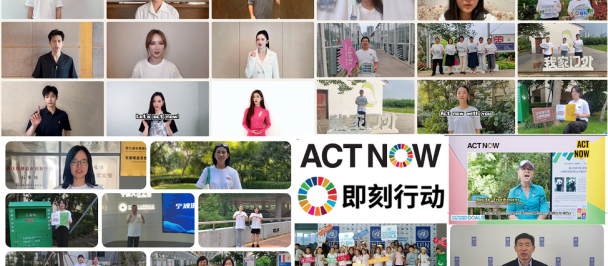Partnership will be key to reaching goals of the UN's 2030 Agenda
December 27, 2023

With 2024 just around the corner, the world's deadline to realize the United Nations Sustainable Development Goals — our global blueprint to safeguard people and the planet by 2030 — grows ever nearer. Unfortunately, achieving the SDGs on time still seems a remote possibility.
Just 15 percent of SDG targets are on track, and progress on more than 30 percent of the targets has stalled or even regressed.
After three years of shocks and crises, including the COVID-19 pandemic, high inflation and the spillover effects of the Ukraine crisis, most developing countries are faced with increasingly constrained fiscal space and spiraling debt. The combined impact of these challenges has set back global development progress by decades.
Furthermore, the climate emergency continues to worsen, threatening humanity's very existence, with 2023 set to be the warmest year on record.
No single country or actor can tackle the pressing global challenges alone. Indeed, the recently concluded COP28 climate summit demonstrated the importance of multilateralism, with the global community reaffirming its commitment to keep global warming within 1.5 C above preindustrial levels and agreeing — for the first time — to transition away from fossil fuels.
But more must be done, and must be done fast. Only through collective efforts, and by continuing to raise our ambition levels, can we hope to set the world on a trajectory toward a sustainable future.
That is why a global development partnership to accelerate the 2030 Agenda is so important.
Strengthened international development cooperation is essential to drive forward global progress on the SDGs, and to maximize effectiveness in light of scarce resources and ever-growing demands.
In particular, through vehicles such as South-South cooperation, stakeholders such as China — now among the top providers of development finance — can make important contributions to sustainable development globally.
"Strengthened international development cooperation is essential to drive forward global progress on the SDGs, and to maximize effectiveness in light of scarce resources and ever-growing demands."
By promoting two-way knowledge exchanges and demand-based cooperation that draws on international best practices and norms, China has the opportunity to help advance sustainable development results in partner countries in areas such as the green energy transition and green finance, building on its strength and experience.
Other actors, beyond governments, are also critical.
With the SDG financing gap standing at around $4 trillion in developing countries, 528 public development banks and development finance institutions, with their $23 trillion in total assets, will be critical to scaling up lending and collaboratively exploring more effective pathways to mobilize resources for the SDGs.
At the same time, the private sector also needs to strengthen investments to help realize the SDGs, including by redirecting finance toward sustainability and by contributing technology and know-how to power the innovation for development.
At the United Nations Development Programme, we stand ready to continue leveraging our expertise and global network across more than 170 countries around the world and convening diverse stakeholders to help advance sustainable development.
Inclusive, multistakeholder partnerships involving traditional donors and practitioners, developing countries, development banks, the private sector and civil society are required to channel the financing needed for sustainable and scalable impact to tackle the many global challenges we face.
Moving forward, the actions we take over the next seven years will determine the future of both the planet and its people. Exchanges help us enhance mutual understanding and provide a platform for stakeholders to collectively advance shared development objectives and collaborate on innovative solutions for the SDGs. Together, let us strengthen the sustainability of our international engagements and ensure an optimal SDG impact that benefits the most vulnerable, and leaves no one behind.
Authored by Beate Trankmann, UNDP resident representative in China.
Originally published in China Daily.

 Locations
Locations


